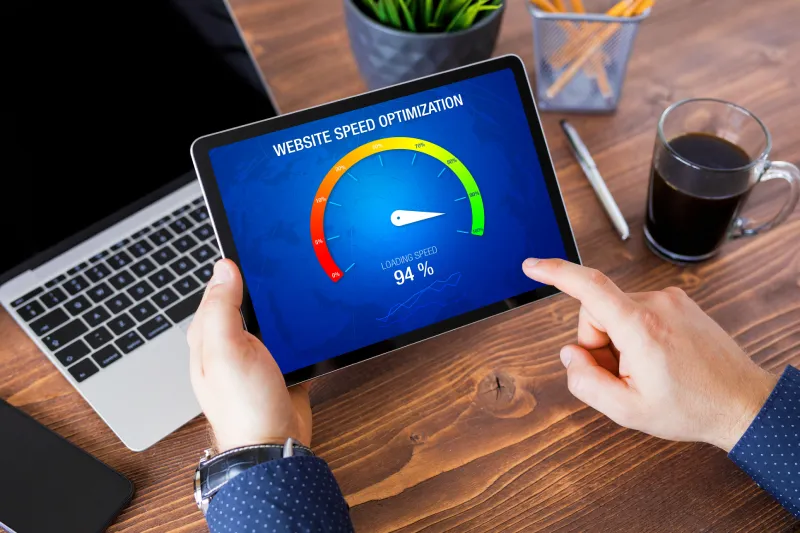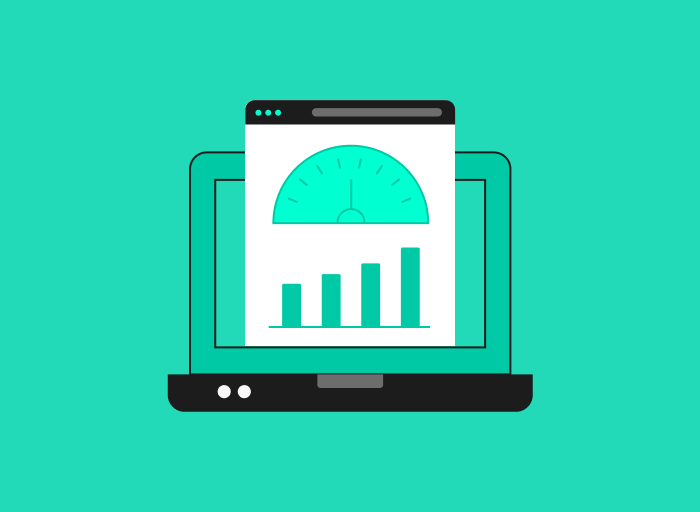Does Page Speed Affect SEO?
Page speed is essential in website development in today's fast-moving digital world. This aspect transcends technical performance, extending its influence into user-friendly page design and search engine optimisation (SEO).
The correlation between how page speed affects SEO and online experience is profound. Websites boasting fast-loading times are more appealing to users and stand to gain immensely in search engine visibility. This connection highlights the evolving nature of web design, where speed is a cornerstone for success.
What Is Page Speed?

Page speed fundamentally is the time a webpage takes to load and display its content to a user. This factor is critical across all browsing platforms, whether users are on desktop or mobile devices. The speed at which a page loads can dramatically impact user experience, engagement, and, ultimately, the site's effectiveness in fulfilling its objectives.
Several technical elements contribute to page speed. All these factors collectively determine how quickly a page becomes fully interactive for the user.
These include:
- server response time, which is the duration it takes for the server to respond to a user request.
- the size and complexity of files, huge image files or multimedia content that can slow down loading times.
- the efficiency of image optimisation, which involves resizing and compressing images without sacrificing quality.
Understanding the distinction between page speed and site speed is also critical. Page speed refers to the loading time of individual pages, whereas site speed is an aggregate measure of the entire website's loading performance.
This differentiation is essential because optimising for page speed often involves addressing specific elements on a page, such as images, CSS, and JavaScript, whereas optimising for site speed may include more comprehensive changes like server configuration and content delivery networks.
The benefits of having a fast page speed are extensive. Firstly, webpages with fast loading times significantly enhance the page design, leading to a more pleasant and efficient user experience. This improvement in user experience often translates into higher engagement rates, longer time on site, and lower bounce rates, as users are less likely to leave a site out of frustration with slow loading times.
Does Page Speed Influence SEO?
And why is page speed important for SEO?
The connection between page speed and SEO is crucial in digital marketing. Answering “Does page speed affect SEO?†requires understanding how search engine algorithms, especially Google's, prioritize website speed.
Websites with quick load times not only improve user experience but also align with search engines' ranking algorithms. This alignment is essential for higher google rankings and pages optimised for search engine visibility.
Optimized page speed's benefits go beyond rankings. Fast sites typically reflect a user-friendly page design and result in higher user engagement, a vital metric for search engines assessing a site's value and relevance. Thus, optimizing for page speed improves not just the technical performance but also a site's overall quality and attractiveness.
Additionally, there's a vital link between page speed and conversion rates, integral to SEO strategy. Sites that load quickly often see higher visitor retention and engagement, impacting their ability to convert visitors into customers. This highlights why page speed is important for SEO.
In today's market, where mobile searches outnumber desktop queries, mobile pages speed is crucial for SEO. Optimizing for mobile ensures a site caters to the extensive mobile user base, reinforcing its SEO ranking.
In essence, page speed's role in SEO encompasses more than just website performance. It's about how quickly loading pages align with search engine goals, boost user engagement and conversion rates, and cater to mobile users. Therefore, the importance of page speed in SEO is not only about the speed but also how it fits into an overall digital strategy.
Page Speed Case Studies
Investigating various case studies on page speed optimisation provides valuable insights into different strategies and their broad impacts. These studies reveal general trends and lessons in pursuing faster webpage loading.
Websites focused on enhancing page speed through techniques like image compression and efficient coding have seen notable improvements in several instances. These enhancements typically lead to better user engagement and higher search engine rankings. This trend underscores the direct connection between page speed and SEO performance, highlighting the benefits of optimisation.
Additionally, there are cases where attempts to increase page speed have not been as successful. These often involve scenarios where the quality of the website's content or user experience is compromised in the pursuit of speed. These examples are a reminder that while speed is critical, it must be balanced with maintaining the website's overall quality.
General observations also indicate that websites prioritising technical improvements and user experience tend to perform better in search engine rankings. The relationship between faster loading times and improved SEO is a recurring theme across various studies, emphasising the importance of page speed in a comprehensive digital strategy.
These case studies collectively demonstrate that effective management of page speed can significantly impact a website's success, both in terms of user satisfaction and search engine visibility. They highlight the importance of a balanced approach in optimising websites for speed.
Tools to Measure Page Speed

In the quest to optimise page speed, one of the first steps is to measure and understand current performance metrics accurately. Various tools are available for this purpose, offering unique features and insights.
Among the most prominent and widely used are Google PageSpeed Insights, GTmetrix, and Pingdom. These platforms stand out due to their comprehensive analysis capabilities and user-friendly interfaces.
Google PageSpeed Insights
Google PageSpeed Insights is a powerful tool provided by Google. It measures the page speed and offers insights into how the page can be optimised for better performance. This tool provides scores for mobile and desktop webpage versions, reflecting Google's emphasis on mobile-first indexing.
With detailed reports on potential bottlenecks, Google PageSpeed Insights is essential for anyone looking to improve their web pages with fast loading times and overall search engine visibility.
GTmetrix
GTmetrix takes a slightly different approach. It combines Google's PageSpeed and YSlow metrics, providing a well-rounded view of a site's performance. GTmetrix allows users to test their pages from different regions, which is crucial for sites with a global audience. The tool also offers a historical performance record, enabling website owners to track their progress. GTmetrix's detailed reports help understand how page speed affects SEO and user experience.
Pingdom
Pingdom is another popular tool that excels in simplicity and clarity. It is renowned for its real-time monitoring feature, which immediately alerts website owners if they have a down or slow site. Pingdom provides a granular breakdown of each element on a webpage, helping pinpoint specific areas needing improvement. Using Pingdom, webmasters can ensure their sites are fast, reliable, and user-friendly.
These tools are crucial for any website looking to improve its page speed. They provide invaluable insights into what affects page load times and offer actionable recommendations for optimisation.
How to Improve Page Speed

How much does page speed affect SEO? Substantially. That's why improving page speed is critical. To begin, consider these actionable steps:
- Optimise Images: Compress and resize images to reduce their load time without sacrificing quality.
- Minimise Code: Streamline HTML, CSS file, and JavaScript by removing unnecessary characters and spaces.
- Use Browser Caching: Store frequently accessed resources locally in the user's browser to speed up subsequent page loads.
- Improve Server Response Time: Choose a reliable hosting solution and optimize your server configuration.
- Enable Compression: Use tools like Gzip to compress your website's files for faster network transfers.
- Leverage a Content Delivery Network (CDN): Distribute content across multiple, geographically diverse servers to decrease load times.
- Eliminate Render-Blocking Resources: Reorganise or defer JavaScript and CSS that interferes with immediate page loading.
- Optimise for Mobile: Ensure your website is mobile-friendly, as mobile responsiveness is crucial for user experience and SEO.
- Convert Images to WebP Format: Switch your images from traditional formats like JPEG or PNG to WebP format, which provides superior compression and quality characteristics, leading to faster loading times without a loss in image clarity.
These improvements are crucial for boosting page speed and play a significant part in crafting a user-friendly page design. By focusing on these aspects, webmasters can profoundly impact how vital page speed is for SEO, elevating their search engine rankings.
Conclusion: Page Speed Matters in SEO
So, does page load speed affect SEO?
The influence of page speed on SEO is undeniable and substantial. Far from being a mere technical detail, page speed has emerged as a fundamental element that profoundly affects everything from user experience to search engine rankings.
As the digital world continues to evolve, the imperative for websites to consistently pursue faster loading times becomes ever more critical. This ongoing pursuit enhances user satisfaction and solidifies a website's standing in the competitive landscape of search engine rankings.





